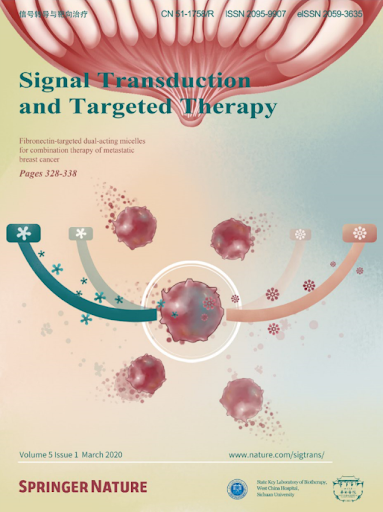Vascular endothelial growth factor signaling in health and disease: from molecular mechanisms to therapeutic perspectives.
IF 40.8
1区 医学
Q1 BIOCHEMISTRY & MOLECULAR BIOLOGY
引用次数: 0
Abstract
Vascular endothelial growth factor (VEGF) signaling is a critical regulator of vasculogenesis, angiogenesis, and lymphangiogenesis, processes that are vital for the development of vascular and lymphatic systems, tissue repair, and the maintenance of homeostasis. VEGF ligands and their receptors orchestrate endothelial cell proliferation, migration, and survival, playing a pivotal role in dynamic vascular remodeling. Dysregulated VEGF signaling drives diverse pathological conditions, including tumor angiogenesis, cardiovascular diseases, and ocular disorders. Excessive VEGF activity promotes tumor growth, invasion, and metastasis, while insufficient signaling contributes to impaired wound healing and ischemic diseases. VEGF-targeted therapies, such as monoclonal antibodies and tyrosine kinase inhibitors, have revolutionized the treatment of diseases involving pathological angiogenesis, offering significant clinical benefits in oncology and ophthalmology. These therapies inhibit angiogenesis and slow disease progression, but they often face challenges such as therapeutic resistance, suboptimal efficacy, and adverse effects. To further explore these issues, this review provides a comprehensive overview of VEGF ligands and receptors, elucidating their molecular mechanisms and regulatory networks. It evaluates the latest progress in VEGF-targeted therapies and examines strategies to address current challenges, such as resistance mechanisms. Moreover, the discussion includes emerging therapeutic strategies such as innovative drug delivery systems and combination therapies, highlighting the continuous efforts to improve the effectiveness and safety of VEGF-targeted treatments. This review highlights the translational potential of recent discoveries in VEGF biology for improving patient outcomes.血管内皮生长因子信号在健康和疾病中的作用:从分子机制到治疗角度。
血管内皮生长因子(VEGF)信号是血管生成、血管生成和淋巴管生成的关键调控因子,这些过程对血管和淋巴系统的发育、组织修复和体内平衡的维持至关重要。VEGF配体及其受体调控内皮细胞的增殖、迁移和存活,在动态血管重构中起关键作用。VEGF信号失调驱动多种病理状况,包括肿瘤血管生成、心血管疾病和眼部疾病。过度的VEGF活性促进肿瘤生长、侵袭和转移,而信号传导不足导致伤口愈合受损和缺血性疾病。vegf靶向治疗,如单克隆抗体和酪氨酸激酶抑制剂,已经彻底改变了病理性血管生成疾病的治疗,在肿瘤学和眼科领域提供了显著的临床益处。这些疗法抑制血管生成和减缓疾病进展,但它们经常面临诸如治疗耐药性、次优疗效和不良反应等挑战。为了进一步探讨这些问题,本文综述了VEGF配体和受体的研究进展,阐明了它们的分子机制和调控网络。它评估了vegf靶向治疗的最新进展,并研究了应对当前挑战的策略,如耐药机制。此外,讨论还包括新兴的治疗策略,如创新的药物输送系统和联合疗法,强调了不断努力提高vegf靶向治疗的有效性和安全性。这篇综述强调了最近在VEGF生物学方面的发现在改善患者预后方面的转化潜力。
本文章由计算机程序翻译,如有差异,请以英文原文为准。
求助全文
约1分钟内获得全文
求助全文
来源期刊

Signal Transduction and Targeted Therapy
Biochemistry, Genetics and Molecular Biology-Genetics
CiteScore
44.50
自引率
1.50%
发文量
384
审稿时长
5 weeks
期刊介绍:
Signal Transduction and Targeted Therapy is an open access journal that focuses on timely publication of cutting-edge discoveries and advancements in basic science and clinical research related to signal transduction and targeted therapy.
Scope: The journal covers research on major human diseases, including, but not limited to:
Cancer,Cardiovascular diseases,Autoimmune diseases,Nervous system diseases.
 求助内容:
求助内容: 应助结果提醒方式:
应助结果提醒方式:


